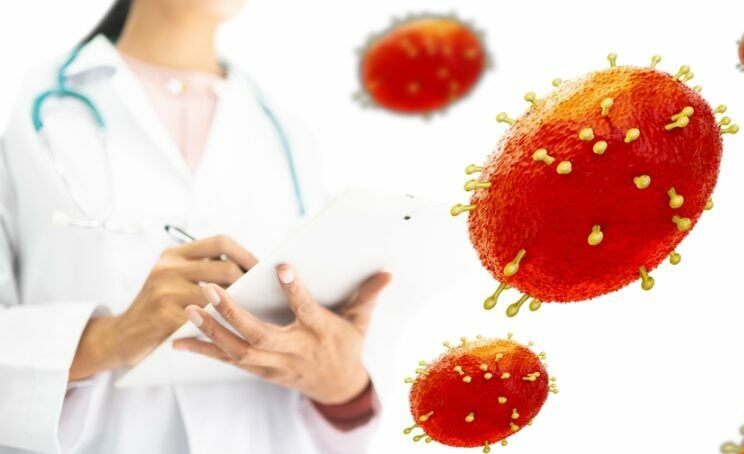With successive infections of the “monkeypox” virus, people feel terrorized, especially following the experience of COVID. The natural question is: Are we facing a new pandemic?
According to the World Health Organization, which raised the alarm, the virus is transmitted to humans from various types of wild animals, but its spread through transmission from one human to another is limited.
It pointed out that “monkeypox” is a rare disease that spreads mainly in remote areas of central and western Africa, near tropical rainforests.
Proven cases
The virus continues to spread in different parts of the world, and the first case of infection was confirmed in Europe on May 7 in a person who had returned to England from Nigeria, where monkeypox is endemic.
Since then, Portugal, Spain, the United States, Sweden, Italy, Belgium, France, and Germany have reported cases of the disease.
The Gulf
Gulf countries rushed to take measures to prevent the spread of the virus, so the UAE Ministry of Health and Community Protection confirmed the readiness of the health sector to deal with Monkeypox through proactive readiness for monitoring and early investigation of cases.
The Ministry of Health and Community Protection took the initiative to study and assess the risk of the epidemic locally, according to the volume of international travel, and to issue a circular for medical cadres working in the country to work on discovering cases and reporting them to the concerned health authorities.
The Ministry has also developed speedy mechanisms for laboratory diagnosis of suspected cases.
The technical advisory team for pandemic control prepared a guide for surveillance, early detection of the disease, management of clinically infected cases, and precautionary measures.
As for Saudi Arabia, the Saudi Ministry of Health has confirmed that it is fully prepared to monitor, investigate and deal with cases if any case appears.
It pointed out that all medical and laboratory tests are available, in addition to an integrated prevention and treatment plan to deal with such cases, should they arise.
In Bahrain, a number of MPs demanded the need to tighten controls, take strict preventive measures, and deal firmly, cautiously, and quickly to prevent the entry of the monkeypox virus.
Date of Appearance
Data shows that the virus first appeared among humans in 1970 in the Democratic Republic of the Congo in a 9-year-old boy.
Since then, it has begun to spread in rural rainforest areas of the Congo River Basin and West Africa, especially in the Democratic Republic of the Congo, where the virus broke out in 1996 and 1997.
In the fall of 2003, confirmed cases were reported in the western-central region of the United States, the first cases reported outside the African continent.
It was found that most of the infected patients had had close contact with domestic prairie dogs.
The virus also returned and spread in 2005 in Unity State in Sudan, and sporadic cases have been reported in other parts of Africa.
In 2009, an awareness campaign among refugees from the Democratic Republic of the Congo to the Republic of the Congo identified and confirmed two cases of monkeypox.
26 cases and two deaths were contained in another outbreak of the disease in the Central African Republic between August and October 2016.
How does it move?
Infection results from direct contact with the blood, body fluids, skin lesions, or mucous fluids of infected animals.
In Africa, cases of infection caused by handling infected monkeys, giant Gambian rats, or squirrels have been reported.
Eating undercooked meat from infected animals is likely to be a risk factor associated with infection.
It can also result from transmission of the disease at the secondary level, or from one person to another through secretions or contact.
The disease is transmitted primarily by respiratory particles that usually require long periods of face-to-face contact, putting family members of active cases at high risk of infection.
Symptoms
The incubation period for monkeypox (the time between infection and the appearance of symptoms) ranges from 6 to 16 days, but can also range from 5 to 21 days.
The researchers refer to dividing the infection stage into two periods, according to the World Health Organization website.
The first period is the invasion period (0 days and 5 days), and its signs include fever, severe headache, enlarged lymph nodes, back and muscle pain, and severe weakness.
In the second stage, the rash appears (within a period ranging between 1 and 3 days after the fever), and the various stages of the appearance of the rash crystallize, which begins on the face most often and then spreads to other parts of the body.
The rash is most severe on the face (95 percent of cases), and on the palms of the hands and soles of the feet (75 percent).
In about 10 days, the rash develops into fluid-filled vesicles and pustules that may take weeks to clear up completely.

Diagnosis
Medicine relies on methods for diagnosing other diseases that cause rashes, such as chickenpox, chickenpox, measles, bacterial skin infections, scabies, syphilis, and types of drug allergies.
Enlarged lymph nodes during the onset of the disease may be an indicator that distinguishes it from smallpox, while monkeypox cannot be diagnosed with certainty except in laboratories.
Vaccines
There are currently no specific drugs or vaccines available to combat monkeypox infection.
But with the emergence of cases of injuries in Britain, the authorities quickly vaccinated some healthcare workers and others at risk of infection.
A spokesman for Britain’s Health Security Agency said there is no specific vaccine for monkeypox, but the smallpox vaccine offers some protection.
Data show that vaccines used to eradicate smallpox are up to 85 percent effective against monkeypox, according to the World Health Organization.
It should be noted that during the COVID-19 pandemic, many outbreaks of monkeypox have been contained on the continent.








